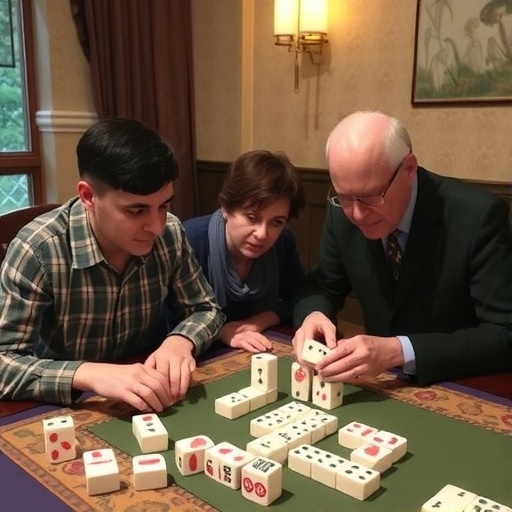In a groundbreaking new study published in BMC Psychiatry, researchers have explored an innovative approach to cognitive rehabilitation for individuals diagnosed with schizophrenia. This pilot, single-blind, randomized controlled trial examined the use of Mahjong, a traditional Chinese tile-based game, as an intervention to potentially enhance cognitive function in this population. Schizophrenia, a severe psychiatric disorder characterized by profound cognitive deficits among other symptoms, has long challenged clinicians seeking effective methods to improve patients’ neuropsychological health and overall quality of life.
The study enrolled 49 schizophrenia patients, randomly divided into two groups: an intervention group receiving standard treatment supplemented with Mahjong cognitive training, and a control group receiving standard treatment alone. The intervention group participated in Mahjong sessions for two hours daily, four days a week over a course of 12 weeks. This structured training aimed to engage multiple cognitive domains, including reaction speed, motor coordination, memory, and executive function, leveraging the complex strategic demands inherent in Mahjong gameplay.
Cognitive outcomes were meticulously assessed using the Cambridge Neuropsychological Test Automated Battery (CANTAB), a highly regarded computerized tool designed to quantify multiple facets of cognition. This enabled a detailed examination of domains such as reaction time, movement speed, visual memory, novel learning abilities, strategic use, and spatial memory performance. Assessments were conducted at four time points: baseline, week 4, week 8, and the conclusion of the intervention at week 12, providing a robust longitudinal perspective on cognitive changes.
Results from the trial revealed that participants in the Mahjong intervention group demonstrated significant progressive improvements in reaction time and movement time, suggesting enhanced processing speed and psychomotor function. These findings highlight Mahjong’s potential as a tool to stimulate neural pathways associated with attention and motor coordination. However, other cognitive domains such as visual memory, novel learning capacity, strategic utilization, spatial memory, and performance on complex visual tasks did not show significant differences compared to the control group.
Beyond cognitive metrics, the study also explored secondary outcomes including quality of life, symptom severity, anhedonia, treatment side effects, and social functioning. Encouragingly, participants undergoing Mahjong training exhibited gradual enhancements in overall quality of life measures by the study’s end. This aspect underlines the holistic benefits of engaging therapeutic games that provide not just cognitive stimulation but also improve motivation, mood, and social engagement aspects, potentially addressing some negative symptoms characteristic of schizophrenia.
Despite promising results, the authors stressed that these findings should be interpreted with caution due to the study’s exploratory nature and relatively small sample size. Larger-scale and longer-duration trials are necessary to validate and broaden these initial insights. The authors advocate for future research to include more diverse populations and investigate potential neural mechanisms underlying observed cognitive gains with Mahjong-based interventions.
This pioneering trial blends the worlds of traditional cultural practices and modern psychiatric treatment, illuminating new possibilities for non-pharmacological cognitive rehabilitation. Integrating a culturally familiar and intrinsically motivating activity like Mahjong may represent a cost-effective, accessible adjunct to existing treatment paradigms. As the mental health field increasingly recognizes the importance of cognitive functioning in schizophrenia prognosis, such innovative interventions could revolutionize therapeutic strategies.
Underlying the success of Mahjong as cognitive therapy are its demands for rapid decision-making, working memory, adaptability, and pattern recognition—cognitive faculties often impaired in schizophrenia. By repeatedly engaging these skills within a social and competitive environment, the intervention may promote neuroplasticity, fostering improved brain network efficiency. This mechanistic hypothesis awaits further neuroscientific validation through advanced imaging studies and biomarker analyses.
The implications of this research extend beyond schizophrenia, hinting at the broader utility of structured game-based cognitive training in various neuropsychiatric disorders characterized by cognitive impairment. Its gamified nature can boost compliance and reduce stigma associated with cognitive rehabilitation, potentially enhancing therapeutic outcomes across diverse clinical settings.
In conclusion, this study not only showcases Mahjong as a potential therapeutic tool but also underscores the necessity of integrating culturally relevant, engaging interventions within mental health treatment frameworks. By pioneering rigorous clinical evaluation of traditional games, researchers set a precedent for holistic and innovative approaches to complex psychiatric disorders, aiming to improve patient quality of life and functional recovery in sustainable ways.
As mental health professionals and neuroscientists seek novel methodologies to combat cognitive impairment in schizophrenia, this Mahjong intervention offers a beacon of hope. Though preliminary, its positive impact on reaction speed and quality of life suggests it could complement pharmacological treatments effectively. Continued research in this vein promises to unlock new horizons in psychiatric rehabilitation and deepen understanding of the interaction between culture, cognition, and brain health.
Subject of Research: The effect of Mahjong intervention on cognitive impairment in patients with schizophrenia.
Article Title: A study on Mahjong intervention to improve cognitive impairment in patients with schizophrenia: a pilot, single-blind, randomized, controlled trial.
Article References:
Hu, R., Xie, Z., Li, J. et al. A study on Mahjong intervention to improve cognitive impairment in patients with schizophrenia: a pilot, single-blind, randomized, controlled trial. BMC Psychiatry 25, 1070 (2025). https://doi.org/10.1186/s12888-025-07321-1
Image Credits: AI Generated
DOI: 10.1186/s12888-025-07321-1
Keywords: Schizophrenia, cognitive impairment, Mahjong, cognitive rehabilitation, randomized controlled trial, neuropsychological testing, CANTAB, quality of life




